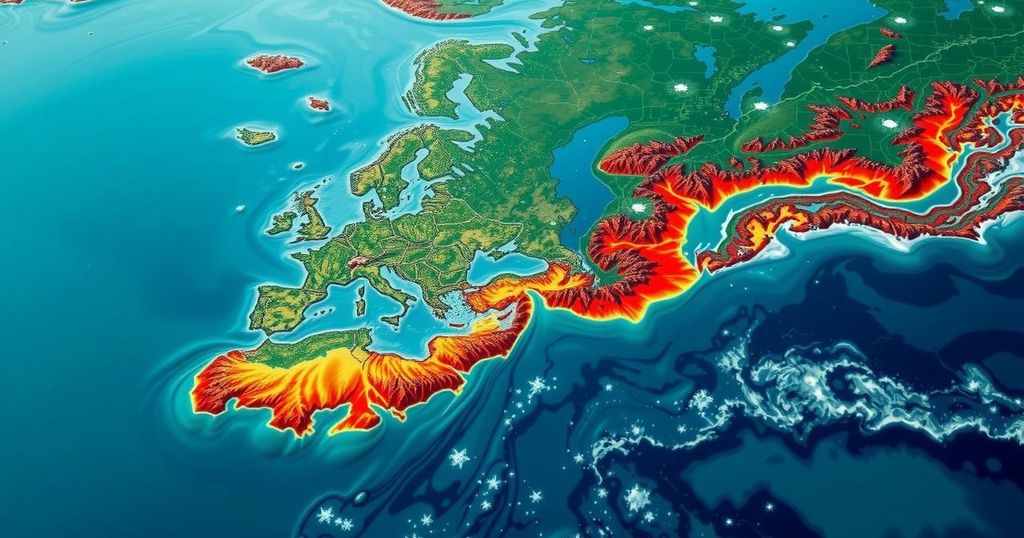The Connection Between Storm Bert and Climate Change: Understanding the Impacts

Storm Bert has raised questions regarding the impact of climate change on severe weather and flooding. Evidence indicates that global warming, driven by human activity, contributes to more frequent and intense storms, including heavy rainfall events. While predicting the impact of climate change on individual storms remains complex, it is clear that such phenomena are becoming more common, emphasizing the need for substantial action against climate-related threats.
At the end of the previous month, Storm Bert wreaked havoc across various regions of the country, prompting urgent questions about the relationship between climate change and severe weather events, particularly flooding. The evidence increasingly points to climate change as a significant factor amplifying the frequency and intensity of storms and floods. Human activities, particularly the emissions of carbon dioxide and other greenhouse gases, contribute to global warming, resulting in a greater incidence of extreme weather phenomena.
The basic principles of climate change are not overly complex. Increased atmospheric temperatures lead to elevated evaporation levels, causing more significant energy accumulation in the atmosphere, which often manifests as more intense winter storms capable of delivering more rainfall in concentrated bursts. This pattern is exacerbated by hotter summers and unpredictable weather fluctuations, all interlinked with human behavior ranging from personal transportation choices to the operations of major fossil fuel industries.
In light of the recent storm, one may ponder whether Storm Bert’s impacts were indeed intensified by climate change. Analysis of recent meteorological activity reveals that storms like Bert typically align with trends anticipated in a warming climate, though determining the direct influence of climate change on such isolated events can be complex. Nevertheless, advancements in atmospheric science have enhanced our understanding of how climate change amplifies the risk of flooding and other weather-related disasters. For instance, researchers have attributed recent floods in Colombia and Valencia to human-driven climate change.
While scientific studies specific to Storm Bert have yet to be released, clear patterns indicate that climate change is a driving force behind the storm’s severe rainfall. Moreover, supplementary human factors have played a detrimental role. For example, forecasting inaccuracies led to delayed rain and flood warnings, and the failure of a flood mitigation structure in Tenbury Wells unexpectedly left properties vulnerable to flooding.
These events underscore critical implications for flood management systems, which require regular maintenance and may not adequately protect against evolving climate threats. Flood defenses established in the past may no longer meet current standards or expectations. A harsh reality remains: while climate change manifests through increasingly severe weather events like Storm Bert, individual behaviors continue to contribute to the problem. Even as international discussions about climate action unfold, tangible progress towards substantial climate solutions seems distant, and society must confront the consequences of continued environmental neglect.
Climate change represents a significant challenge in contemporary society, markedly impacting weather patterns and intensifying various natural disasters. The phenomenon is largely driven by human activities that release greenhouse gases into the atmosphere. As the planet’s climate warms, weather events become increasingly severe, leading to more frequent storms and heavy rainfalls, thereby contributing to higher occurrences of flooding. The urgency to understand these connections has grown amid heightened awareness of ongoing climate impacts, which affects both infrastructure and daily life.
In summary, while Storm Bert exemplifies the increased intensity and frequency of storms associated with climate change, it also highlights the need for revisiting flood prevention strategies to better withstand such events. Although scientific evidence suggests a clear link between climate change and severe weather, human contribution to environmental degradation persists. Moving forward, the global community must prioritize effective action to mitigate climate impacts and adapt to new realities brought on by our changing climate.
Original Source: www.bbc.co.uk






